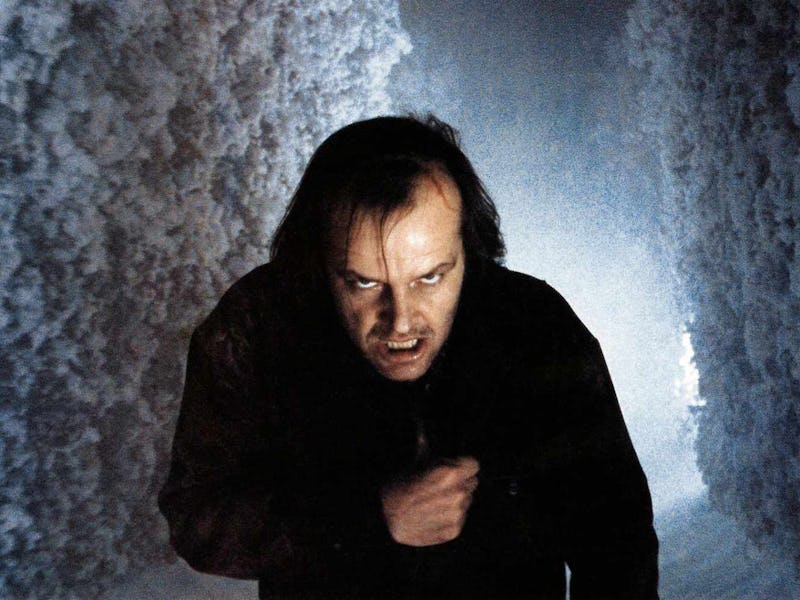Stanley Kubrick Made A Horror Classic By Destroying His Source Material
The book is just a suggestion.

Stephen King still doesn't like it, but Stanley Kubrick's adaptation of The Shining, which celebrates its 45th anniversary today, remains a landmark in horror movie history. Kubrick took extensive liberties with King's text, turning a deeply personal novel about the corruption of a broken man's love for his family into a cold, distant study of isolation, addiction, and psychosis. Yet by making the film — and perhaps the Overlook Hotel itself — into an otherworldly, stubbornly neutral viewer, Kubrick made the evil inherent in the story even more malevolent and enigmatic.
Published in 1977, The Shining follows Jack Torrance, a failed teacher and recovering alcoholic, as he, his wife Wendy, and their psychic young son Danny spend the winter at Colorado’s isolated Overlook Hotel, where a desperate Jack has landed a job as caretaker of the closed-for-the-season resort. Alone and snowbound, the family is plagued by manifestations and revenants from the Overlook’s sordid history that begin to chip away at Jack’s sanity.
While the Overlook became one of horror’s great haunted houses, the book also channeled King’s personal struggles: with alcoholism, with fears about whether he’d succeed as a novelist, with feelings of resentment toward his children that had festered during the Kings’ lean years. But there’s also clear warmth between the characters, especially in the touching relationship between Jack and Danny, which father and son battle to preserve right down to the final moments of Jack’s life.
Kubrick kept the basic structure and plot of King’s book, but removed much of its compassion and humanity. Cast as Jack Torrance, Jack Nicholson played the role as unhinged from the get-go, displaying little affection for his son or wife (Shelly Duvall as the latter, reimagined from the book’s resourceful, strong-minded woman into a near-hysteric, didn’t help). With the film’s Jack Torrance losing his marbles early, there’s no emotional or psychological arc, just a long descent that seems preordained and evokes little empathy.
King was especially displeased with this aspect of Kubrick’s adaptation, telling Playboy in 1983 that “the film has no center and no heart.” But while King’s gripes are fair — and he’s not the only one to point them out — there’s another way to look at the film that makes Kubrick’s chilly lens the conduit for a different, more abstract kind of evil that’s helped keep it on lists of the scariest movies of all time.
As well as lists of the most memorable movie carpets.
Kubrick’s Steadicam follows the Torrances incessantly, tracking them as they prowl the Overlook’s corridors as though patiently waiting for the worst to happen. Is the camera a manifestation of the Overlook itself, watching while the Torrances tear each other apart through distrust and fear? Has the hotel been watching them ever since Jack got the job?
The camera acts almost as an omniscient outside observer, while the film constantly places the three family members against the labyrinthine vastness of the hotel and the empty, frozen landscape around it, like animals trapped in a maze. Could it be that the ultimate evil isn’t the restless spirits that inhabit the Overlook, nor the demons that plague Jack’s mind and soul, but an uncaring universe itself, represented by that ever-present gaze?
Kubrick doesn’t provide any easy answers. While King’s book brilliantly and emotionally chronicles the way the Overlook’s supernatural forces break down Jack’s mind and turn him into a would-be murderer, Kubrick’s The Shining dispenses with all that. The true nature of the evil in the film is ambivalent throughout, and the movie may be one gigantic metaphor for the destruction of the nuclear family through economic, sociological, and psychological pressures from the world in general.
King’s simple but heartfelt story about a father and husband whose own demons are no match for those infesting an old hotel becomes, in Kubrick’s hands, a disturbing exploration of how the pervasive indifference of life itself bears down on flawed, ordinary human beings until they shatter under that relentless, unseen, omnipresent weight. King’s tale is frightening and poignant on its own terms, but Kubrick’s unblinking, unsympathetic cinematic eye reinvents The Shining into something more unknowable... and perhaps even more terrifying.